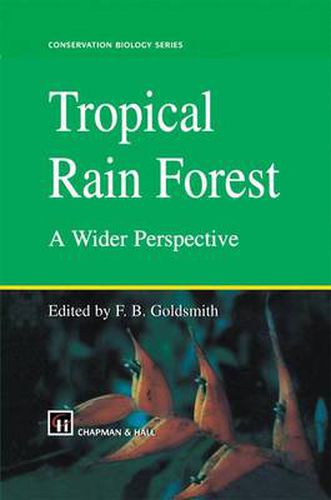Readings Newsletter
Become a Readings Member to make your shopping experience even easier.
Sign in or sign up for free!
You’re not far away from qualifying for FREE standard shipping within Australia
You’ve qualified for FREE standard shipping within Australia
The cart is loading…






This title is printed to order. This book may have been self-published. If so, we cannot guarantee the quality of the content. In the main most books will have gone through the editing process however some may not. We therefore suggest that you be aware of this before ordering this book. If in doubt check either the author or publisher’s details as we are unable to accept any returns unless they are faulty. Please contact us if you have any questions.
The international perspective for this book is the unprecedented level of concern over deforestation, recognized by the meeting of world leaders at the 1992 Earth Summit, in Rio do Janeiro, and culminating in the appoint ment of the Intergovernmental Panel on Forests (IPF), under the auspices of the UN Commission on Sustainable Development. The wide range of issues covered by the authors in this volume reflects the breadth of the interna tional debate, from national policies and activist campaigning, through eco nomic and social objectives, to the sustainable management of forest and soil resources. Since the conservation campaigns of the 1980s, the focus of international concern has widened from tropical rain forests to all forest formations, in all regions, with increased recognition of global values and common responsibil ities. However, while forest cover in some temperate countries is increasing, irrational deforestation, at historically unprecedented levels of damage to biodiversity and to other environmental values, remains most acute in tropi cal countries, where the need to use the natural resources for sustainable development is greatest, and the capability weakest. While accepting the urgency of the situation, and the need for greater coherence of action at a global level, the 1997 report of the IPF to the UN Commission emphasized the powers and responsibilities of national governments, and the importance of National Forest Programmes, but with the fuller participation of local communities, and with enhanced access to international assistance.
$9.00 standard shipping within Australia
FREE standard shipping within Australia for orders over $100.00
Express & International shipping calculated at checkout
This title is printed to order. This book may have been self-published. If so, we cannot guarantee the quality of the content. In the main most books will have gone through the editing process however some may not. We therefore suggest that you be aware of this before ordering this book. If in doubt check either the author or publisher’s details as we are unable to accept any returns unless they are faulty. Please contact us if you have any questions.
The international perspective for this book is the unprecedented level of concern over deforestation, recognized by the meeting of world leaders at the 1992 Earth Summit, in Rio do Janeiro, and culminating in the appoint ment of the Intergovernmental Panel on Forests (IPF), under the auspices of the UN Commission on Sustainable Development. The wide range of issues covered by the authors in this volume reflects the breadth of the interna tional debate, from national policies and activist campaigning, through eco nomic and social objectives, to the sustainable management of forest and soil resources. Since the conservation campaigns of the 1980s, the focus of international concern has widened from tropical rain forests to all forest formations, in all regions, with increased recognition of global values and common responsibil ities. However, while forest cover in some temperate countries is increasing, irrational deforestation, at historically unprecedented levels of damage to biodiversity and to other environmental values, remains most acute in tropi cal countries, where the need to use the natural resources for sustainable development is greatest, and the capability weakest. While accepting the urgency of the situation, and the need for greater coherence of action at a global level, the 1997 report of the IPF to the UN Commission emphasized the powers and responsibilities of national governments, and the importance of National Forest Programmes, but with the fuller participation of local communities, and with enhanced access to international assistance.